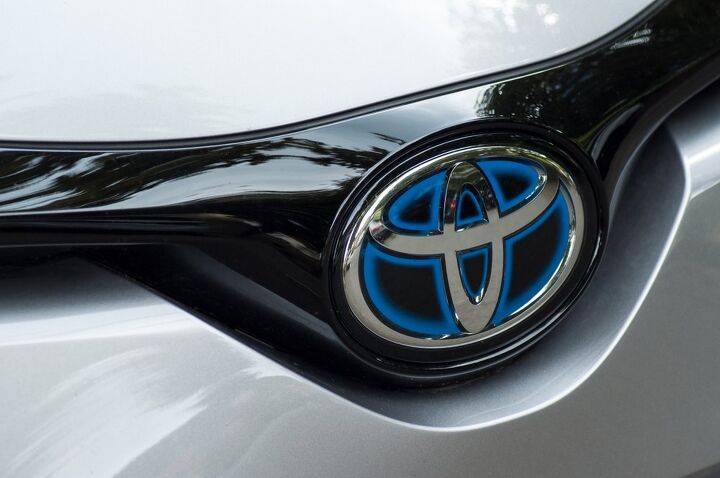Toyota Announces Product Development Deal With China's BYD

On Friday, Toyota Motor Corp. announced it had signed an agreement for the joint development of battery electric vehicles (BEVs) with China’s BYD Company Ltd. Technically, BYD also made an announcement but we’re not scouring their press page on an hourly basis. Toyota gets top billing.
According to the release, the two companies will jointly develop “sedans and low-floor SUVs as well as the onboard batteries for these vehicles and others with the aim to launch them in the Chinese market under the Toyota brand in the first half of the 2020s.”
Having previously announced it was teaming up with Contemporary Amerex Technology (CATL) and Panasonic to supply and develop batteries, Toyota is trying to expand rapidly into electric development — after showing limited interest for years. We’ve no clue how these partnerships will influence the brand’s physical products outside of Asia but, at the very least, it should have fewer battery supply issues than some of the competition moving forward.
The current strategy (these things are always subject to change) sees Toyota targeting 50 percent of global sales as EVs, which includes hybrids, by 2025. That’s five years sooner than previously scheduled. Presumably, these new new partnerships are necessary to make that happen.
From Toyota:
To curb global warming, both BYD and Toyota seek to reduce CO2 emissions by promoting the widespread use of BEVs. To accomplish these goals, both companies believe there is a need to put aside their rivalry and collaborate; therefore, the two companies have agreed to jointly develop BEVs.
Going forward, BYD and Toyota will make use of the electrified vehicles, and battery development technologies they have acquired through their market introductions and will work together to further develop BEVs that are attractive to customers and in further promoting their widespread adoption.
[Image: NeydtStock/Shutterstock]

A staunch consumer advocate tracking industry trends and regulation. Before joining TTAC, Matt spent a decade working for marketing and research firms based in NYC. Clients included several of the world’s largest automakers, global tire brands, and aftermarket part suppliers. Dissatisfied with the corporate world and resentful of having to wear suits everyday, he pivoted to writing about cars. Since then, that man has become an ardent supporter of the right-to-repair movement, been interviewed on the auto industry by national radio broadcasts, driven more rental cars than anyone ever should, participated in amateur rallying events, and received the requisite minimum training as sanctioned by the SCCA. Handy with a wrench, Matt grew up surrounded by Detroit auto workers and managed to get a pizza delivery job before he was legally eligible. He later found himself driving box trucks through Manhattan, guaranteeing future sympathy for actual truckers. He continues to conduct research pertaining to the automotive sector as an independent contractor and has since moved back to his native Michigan, closer to where the cars are born. A contrarian, Matt claims to prefer understeer — stating that front and all-wheel drive vehicles cater best to his driving style.
More by Matt Posky
Latest Car Reviews
Read moreLatest Product Reviews
Read moreRecent Comments
- 28-Cars-Later "The vehicle in question is a 2012 Rolls-Royce Ghost and, despite numerous outlets claiming it retails for over $250,000, you can easily find one in good condition for less than half that."What a deal! /s
- Ajla Some real journalism truth to power in that article as well:"Of course, there are plenty of concerns around China’s poor human rights track record""And yet, those issues feel secondary."
- Rochester The made-in-Japan comparison doesn't work, because by the time they entered the US automotive market we were political allies. With China we're just economic allies, for as long as it suits them.
- Jalop1991 CX-5 seats SUCKED. They'd better fix those first.
- 3-On-The-Tree Any car with turbos will have extra maintenance costs.


































Comments
Join the conversation
Actually, I am very surprised that Toyota even NEEDS a partner for this, considering how they single-handedly (invented ?) developed the whole category of hybrid cars and marketed them so successfully. They obviously could do it again since electrics have many of the same issues to solve as hybrids. I smell a strong odor of bean-counter...er...salaryman's cologne in the air at the management meeting where this was cooked up. And the smell of failure.
Toyota has been very actively involved in EV development all along. They were just quiet about it. Evidence? Here's a link to their solid-state battery patent filings. The fact that they're moving more quickly to electric indicates they've had some success in getting solid-state batteries closer to mass production. Sometimes I think the whole hydrogen thing was a bit of a smokescreen. Look at all of the work they've been doing in the background on batteries. I think they were trying to send their competitors down the wrong path. Hey, I'd do the same thing. https://patents.google.com/?q=solid-state&q=battery&assignee=%22toyota+motor%22&oq=assignee:%22toyota+motor%22+solid-state+battery